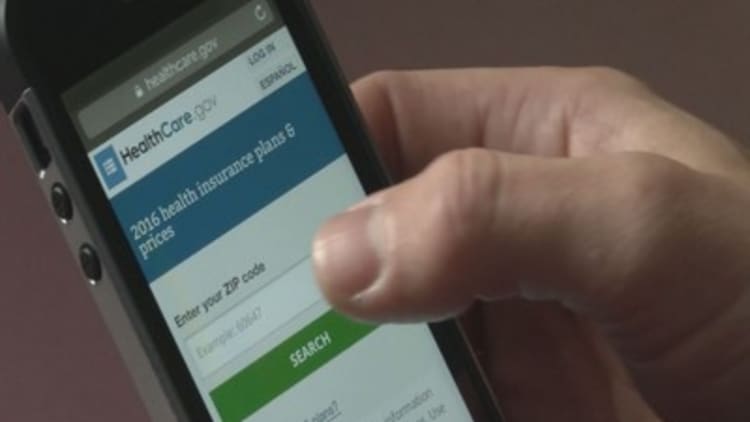
As Obamacare turns 6 this year, President Barack Obama fended off a new challenge to his signature health-care initiative. On Friday, he vetoed an attempt by the Republican-led Congress to repeal the law.
Yet in an interview with CNBC's "On The Money," a top hospital executive warned that while the Affordable Care Act survived a repeal attempt, it's locked in a tough game of numbers — and few of them are favorable.
"Premiums are going up, deductibles are higher and that's a problem," Dr. Kenneth Davis, Mount Sinai Health System president and CEO said. His comments differed from the sentiments he expressed barely a year ago, when he spoke favorably of the law's benefits to CNBC.
Read More I believe in Obamacare: Mount Sinai Health CEO
"What it's all about is that not enough healthy people have signed up," Davis added. Part of the reason, he said, is that because penalties embodied by the so-called individual mandate are "rather minimal."
Penalties are too 'minimal'
According to HealthCare.gov, the fee for not having health insurance in 2016 is 2.5 percent of household income, or $695 per adult, whichever is higher. The penalty is also $347.50 for each child, up to a maximum of $2,080. That represents an increase from last year's penalties, which were 2 percent of income, or $325 per adult.
Davis says this year "perhaps" the higher penalties are enough that "more healthy young people between the ages of 25 and 35" will join, thus increasing the pool of healthy, younger applicants.
"They diminish the cost of insurance by distributing it over a larger population," Davis said. He highlighted Obamacare's age gap, saying that the number of young people currently signed up "right now is about 26 percent." That's far from sufficient, he said.
"Roughly the estimate is 35 to 40 percent of the risk pool" needs to be in their mid-20s and mid-30s, Davis said, or "the whole insurance system becomes in trouble."
Davis says another upcoming challenge to Obamacare is consolidation in the insurance industry.
Anthem recently announced a $54 billion purchase of Cigna, while Humana is being acquired by Aetna. Both deals await approval by federal regulators.
The deals would cut the nation's the top five insurance companies to three, with United Healthcare (UHC) still being the largest. But UHC has already warned it may stop selling the money-losing exchange plans in 2017.
"Obviously, there will be less competition, and that's a problem," Davis said. "In some markets that's really a problem because there can only be one insurer. So the FTC really has to look at that, market by market."
Not all bad
Despite its drawbacks, Davis acknowledged patients have improved access to health care under Obamacare. According to a recent CDC study, the number of uninsured Americans is now under 10 percent, its lowest level since 1972.
In terms of cost cutting and looking ahead, Davis asked "What are the drivers of health-care expenses and how are we going to curtail that increase?"
End-of-life spending is a big factor, he said. "Part of the problem is that 25 percent of Medicare dollars are spent in the last year of life, and we still have done very little to change how we approach end-of-life care."
Davis pointed to the need for advance directives or living wills. An advance directive is a legal document prepared ahead of time, outlining a person's wishes for end-of-life medical treatments they do or do not want.
"Advance directives are very helpful, but what we often find is that when patients get end-of-life diseases there are no advance directives," the CEO stated. At that point, its "too late," he said. For that reason, doctors "sit around and say, 'Gee, I guess we've just got to do everything'" to save the patient's life.
Davis acknowledged it's a "hard question," but he argued that an advanced directive could streamline the process.
"That would change everything," he said.
"On the Money" airs on CNBC Sundays at 5:30 a.m.ET, or check listings for air times in local markets.





